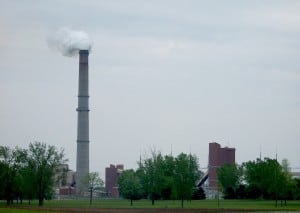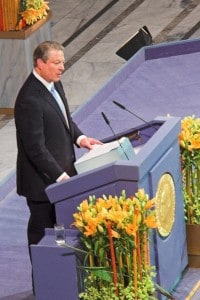When it comes to climate change, the main take-away is that it is real. That being said, efforts by climate change deniers (at least one of whom regularly submits letters to this paper) to convince people that the science on human-caused climate change is far from settled have been quite successful. As the Paris Climate Change Conference concludes and Canada prepares to firm up its greenhouse gas reduction commitments, I think it is important to understand just how outrageous, illogical and dangerously irresponsible climate change denial actually is.
Because almost none of us are climate scientists ourselves, we have to put our trust in experts in order to reach an informed position. This is not only true for climate change but for all scientific issues. Granted, coming to an informed position can be difficult, since much of science truly is unsettled. Such is often the case in medicine, for example, or with regard to the health benefits or dangers of different foods. It is also where science finds itself right now with regard to the identity of our direct hominid ancestors; what caused the extinction of the dinosaurs, and how life itself began. All of this means that the only responsible position is to say, “We don’t know for sure” or “the jury is still out.” In addition, it is the very nature of science that nothing is ever 100 percent settled. New research is always revising the details.
Scientific Consensus
For me, the whole issue on what to believe – with a high measure of confidence – comes down to the strength of the scientific consensus. By definition, a consensus is based upon evidence. It is arrived at by relevant experts in the field using the scientific method to determine what it true, and using this same method to try to disprove the findings of their colleagues – if they can. It’s what scientists do, it’s how they make a name for themselves, and it is how the body of scientific knowledge advances. When the evidence is weak, conflicting or preliminary, opinions proliferate, such as in the examples given previously. If the evidence is convincing enough, however, there is a tendency for the scientific community to come together with a near-single opinion, at least about the big picture. In other words, when you get enough evidence, a consensus emerges. Such is the case now with respect to everything from plate tectonics and the germ theory of disease to evolution by natural selection and that cigarettes cause cancer. It is also the case with human-caused climate change. Climate science has followed exactly the same rigorous, peer-reviewed process that arrived at these other scientific truths.
According to the International Panel on Climate Change, the United Nations body that evaluates climate change science, there is a 97% consensus among climate scientists that human-caused climate change is real. Equally compelling, these scientists are 95% confident in this conclusion. A scientific consensus does not get much higher than this. Remember, too, that these scientists are working all over the world, do not necessarily share the same motivations, are often highly competitive, and have every motivation to disprove each other’s findings – in the name of what is true. This makes the consensus even more compelling.
Some science deniers, be they on the left or the right of the political spectrum, seem to believe that mainstream science (or the government or large corporations) can just “manufacture” a scientific consensus and keep the real findings secret. This, of course, is conspiracy thinking. Some liberals, for example, blame big corporations for conspiring to hide the truth about genetically modified organisms (GMOs). Likewise, some conservatives blame government, government-funded scientists, and intergovernmental organizations like the United Nations or the Intergovernmental Panel on Climate Change for conspiring to hide the truth, fudge the data and be dishonest about human-caused climate change. The idea that organizations could unscrupulously manufacture data – that its members could be in cahoots with each other over all of this time without the truth getting out – is preposterous. Every country and national scientific association on the planet would have to be in on this together.
Settled Science
Deniers often ridicule the use of the term “settled science” when it comes to climate change. This is an unfortunate expression because it leads to confusion. What settled science refers to is that “we’re ready to act upon this information (based on the high quality of evidence) and make decisions.” It doesn’t mean that the science stops and/or that science is no longer open to new evidence. It simply a recognition that there is no significant, legitimate controversy about the central idea. If you know any climate change deniers, agnostics or people who downplay the risks, ask them if it would be responsible NOT to act and start limiting greenhouse gas emissions when science is 95% sure of the cause? We make decisions to act all the time in science and medicine when our level of certainty is well below that. To use an analogy, if we were 40% sure that an asteroid was on course to slam into Earth, would we wait until we were 100% sure before planning a course of action? Of course, not. We would probably act at 10%.
It is no longer incumbent upon climate scientists to produce more and more evidence that humans are the main cause of climate change. They have met their burden of proof. There is no real debate occurring in the scientific community about the legitimacy of the evidence. If there was, the story would be all over the mainstream news, and some scientist(s) would become famous in the process. Rather, it is now incumbent upon deniers to produce an equal amount of valid science that the 97 percent of climatologists are mistaken. And we aren’t just talking about a technical error here or there, a case of exaggeration, or an inappropriate email. Deniers need to show the world a mountain of peer-reviewed data. The evidence for human-made climate change, like evolution, is at a point now where it cannot be wrong; it can only be incomplete. There is simply no other big picture explanation for all of the evidence that exists. Improvements in our understanding of the details will certainly occur, but it is nearly impossible that the fundamentals as understood in 2015 are wrong.
Al Gore was right when he wrote that the truth about climate change is inconvenient. In fact, it is the perfect storm of environmental problems and solutions will be difficult, controversial and costly. We will have to be open to many different technologies – maybe even geoengineering and expanded use of nuclear power. That being said, the science is the science. This trumps ideological interests, political interests, and the interests of corporations. Yes, there is a role for healthy scepticism of scientific findings when the evidence is weak or preliminary, but not when an overwhelming scientific consensus exists and when the future of civilisation as we know it hangs in the balance.

